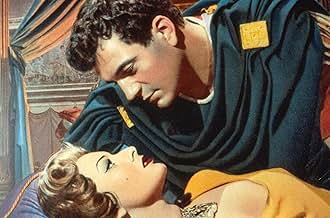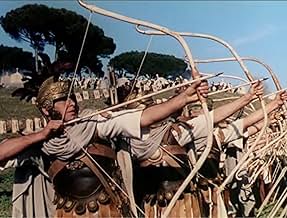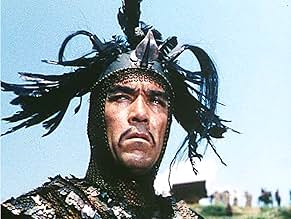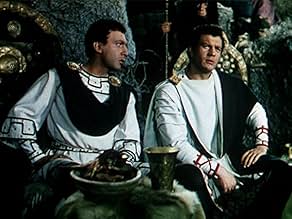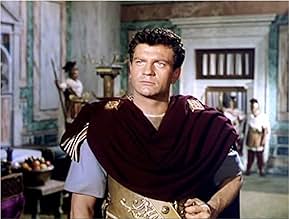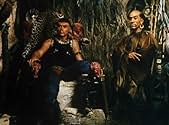IMDb-BEWERTUNG
5,4/10
824
IHRE BEWERTUNG
Füge eine Handlung in deiner Sprache hinzuAttila, the leader of the barbarian Huns and called by the Romans "The Scourge of God", sweeps onto the Italian peninsula, defeating all of the armies of Rome, until he and his men reach the... Alles lesenAttila, the leader of the barbarian Huns and called by the Romans "The Scourge of God", sweeps onto the Italian peninsula, defeating all of the armies of Rome, until he and his men reach the gates of the city itself.Attila, the leader of the barbarian Huns and called by the Romans "The Scourge of God", sweeps onto the Italian peninsula, defeating all of the armies of Rome, until he and his men reach the gates of the city itself.
Anthony Quinn
- Attila
- (as Anthony Qvinn)
Eduardo Ciannelli
- Onegesius - Counselor to Attila
- (as Eduardo Cianelli)
Empfohlene Bewertungen
Although not without its unintentionally funny moments, compared to most of the Sword and Sandal films that were churned out by Hollywood on the Tiber, this one is not at all bad.
Anthony Quinn's testosterone filled, Alpha male performance here certainly fits historian Edward Gibbon's description of Attila as 'a formidable barbarian' whilst the oestrogen of pneumatic Sophia Loren as Honoria practically leaps off the screen. Honoria was a tragic character who had the misfortune to be born the daughter of an emperor and to be treated miserably by her domineering mother but her one-dimensional portrayal here is par for the course in films of this type.
The year this film was released was notable for both Quinn and La Loren as he also appeared in a little opus entitled 'La Strada' and she was directed for the first time by Vittorio de Sica in the 'Pizza con credito' segment of 'L'Oro di Napoli' in which he brought out the Neapolitan earthiness and innate comedic ability that were to serve her so well through the years, not least in the amusing 'Peccato che sia una canaglia' from the same year which marked the first of her many films with a certain Marcello Mastroianni.
A good supporting cast, all of whom are adequately 'dubbed' comprises Colette Régis as the wilful Galla Placidia and Henri Vidal as Aetius. The emperor Valentinian III, described by Gibbon as 'feeble and dissolute', is convincingly played by Claude Laydu who will forever be associated with the title character of Bresson's 'Journal d'un curé de compagne'. Mention must be made of the wondrous Irene Papas in the minor role of one of Attila's many wives. She was to go from strength to strength, especially in classical Greek tragedy and utilised what one critic has called her 'elemental nobility' as the widow opposite Quinn's Zorba. For those interested in such things, neither Honoria nor Aetius met their ends in the manner depicted here.
Designed to warm the hearts of the Faithful, the final scene, complete with heavenly chorus and a crucifix in the sky, shows Attila being persuaded by Pope Leo not to attack Rome. It is not known what was said or indeed what inducements were offered but it is doubtful whether a heathen such as Attila would have been swayed by Leo's eloquence and sacerdotal robes alone and it is more likely that he turned back because of plague in his army, lack of food and the threat of Roman reinforcements from the East.
Oh well, as the man said, 'it's only a movie.'
Anthony Quinn's testosterone filled, Alpha male performance here certainly fits historian Edward Gibbon's description of Attila as 'a formidable barbarian' whilst the oestrogen of pneumatic Sophia Loren as Honoria practically leaps off the screen. Honoria was a tragic character who had the misfortune to be born the daughter of an emperor and to be treated miserably by her domineering mother but her one-dimensional portrayal here is par for the course in films of this type.
The year this film was released was notable for both Quinn and La Loren as he also appeared in a little opus entitled 'La Strada' and she was directed for the first time by Vittorio de Sica in the 'Pizza con credito' segment of 'L'Oro di Napoli' in which he brought out the Neapolitan earthiness and innate comedic ability that were to serve her so well through the years, not least in the amusing 'Peccato che sia una canaglia' from the same year which marked the first of her many films with a certain Marcello Mastroianni.
A good supporting cast, all of whom are adequately 'dubbed' comprises Colette Régis as the wilful Galla Placidia and Henri Vidal as Aetius. The emperor Valentinian III, described by Gibbon as 'feeble and dissolute', is convincingly played by Claude Laydu who will forever be associated with the title character of Bresson's 'Journal d'un curé de compagne'. Mention must be made of the wondrous Irene Papas in the minor role of one of Attila's many wives. She was to go from strength to strength, especially in classical Greek tragedy and utilised what one critic has called her 'elemental nobility' as the widow opposite Quinn's Zorba. For those interested in such things, neither Honoria nor Aetius met their ends in the manner depicted here.
Designed to warm the hearts of the Faithful, the final scene, complete with heavenly chorus and a crucifix in the sky, shows Attila being persuaded by Pope Leo not to attack Rome. It is not known what was said or indeed what inducements were offered but it is doubtful whether a heathen such as Attila would have been swayed by Leo's eloquence and sacerdotal robes alone and it is more likely that he turned back because of plague in his army, lack of food and the threat of Roman reinforcements from the East.
Oh well, as the man said, 'it's only a movie.'
The acting schools are extremely expensive. And what they teach you is how to control your breathing, how to scratch your balls or jump up. Anthony Quinn is a real acting school only by himself, just watching any of his movies, you have a lot to learn. Even in this film, the one born in Chihuahua, Mexico, makes us a great demonstration of huge talent, embodying "The Scourge of God". He is the most credible Attila of all the movies. Sophia Loren, very young, is good as Honoria. Henri Vidal is convincing too as Aetius. Same Claude Laydu as the idiot Emperor Valentiniano Caesar. Irene Papas, also very young, is OK as Grune. Christian Marquand, who was to become the director of the "Candy" masterpiece, is a Hun leader.
It's very hard to make a film about Attila and his times because if you want to make it historically accurate, well, that's not a simple thing. There are many Church traditions about Attila and his eventual sparing of Rome but historians of the day were notorious for shaping it to make themselves or their leaders look best. It is what it is...or was. So, it's difficult to say exactly what Attila did....such as the death of his brother...of which are contradictory accounts. This version of his latter days is based mostly on Church traditions.
Like many films of the 1950s and 60s, European filmmakers hired a famous American actor to star in the production. In this case, Anthony Quinn plays Attila the Hun...and he also appeared in a few other European films, such as Fellini's "La Strada". And, Quinn was then dubbed into Italian...as most of the actors in the film are Italians (though it's a French-Italian co-production).
The story is set from the period in which Attila agreed to a substantial bribe by the Romans not to destroy the Empire. Shortly after this, Attila reneged on the agreement and a long strong of bloody battles resulted. This film dramatizes this period and offers a traditional view as to why he spared Rome.
The film is well made and entertaining....it just isn't perfect history because of all the speculation. But this is NOT a reason to skip the film. It's well worth your time and it's also nice to see Sophia Loren in a supporting role early in her film career.
By the way, although the acting was generally good, the character Emperor Valentinian III seemed a bit overacted. Perhaps I'm wrong...he just didn't seem all that realistic.
Like many films of the 1950s and 60s, European filmmakers hired a famous American actor to star in the production. In this case, Anthony Quinn plays Attila the Hun...and he also appeared in a few other European films, such as Fellini's "La Strada". And, Quinn was then dubbed into Italian...as most of the actors in the film are Italians (though it's a French-Italian co-production).
The story is set from the period in which Attila agreed to a substantial bribe by the Romans not to destroy the Empire. Shortly after this, Attila reneged on the agreement and a long strong of bloody battles resulted. This film dramatizes this period and offers a traditional view as to why he spared Rome.
The film is well made and entertaining....it just isn't perfect history because of all the speculation. But this is NOT a reason to skip the film. It's well worth your time and it's also nice to see Sophia Loren in a supporting role early in her film career.
By the way, although the acting was generally good, the character Emperor Valentinian III seemed a bit overacted. Perhaps I'm wrong...he just didn't seem all that realistic.
A pretty lacklustre film in all truth. I watched it mainly because of my interest in this period in history but the general audience will not find much here to excite them. It's very slow and mostly dialogue, not particularly good dialogue either. The premise is to show the internal power struggles going on inside each court before we get the big battle at the end, it's very pedestrian though in getting there and you can see what's going to happen from the start. The film is shot in colour and does feature some nice sets, costumes props, etc. Sophie Loren is in here and very good and strong considering she would only have been about 20 at the time I think. We do at least get one good battle at the end, I would have been disappointed if it didn't.
Destroying towns and cities across the Alp to Italy, the mounted hordes led by Attila, King of the Huns, reached the gates of Rome where they were stopped by the Cross and turned back by Pope Leo I...
Anthony Quinn is Attila, the infamous 5th Century barbarian in this Italian unworthy spectacular...
Sophia Loren offers a pretty presence as the ambitious tempting Honoria who accepts Attila as a husband just to save Rome... She loses her life and half of her kingdom...
Quinn tries his best in his portrayal of the infamous Attila, but the script is bad and unreasonable...
Anthony Quinn is Attila, the infamous 5th Century barbarian in this Italian unworthy spectacular...
Sophia Loren offers a pretty presence as the ambitious tempting Honoria who accepts Attila as a husband just to save Rome... She loses her life and half of her kingdom...
Quinn tries his best in his portrayal of the infamous Attila, but the script is bad and unreasonable...
Wusstest du schon
- WissenswertesAnthony Quinn worked on Das Lied der Straße (1954) simultaneously with this movie. He remarked that it had a much smaller budget than the Attila epic, but considered it a much better film.
- Crazy CreditsAlthough this was an Italian co-production shot in Italy, Eduardo Ciannelli's name is misspelled in the credit.
- VerbindungenFeatured in Soldiers: Cavalry (1985)
Top-Auswahl
Melde dich zum Bewerten an und greife auf die Watchlist für personalisierte Empfehlungen zu.
- How long is Attila?Powered by Alexa
Details
Box Office
- Budget
- 450.000.000 ITL (geschätzt)
- Laufzeit
- 1 Std. 20 Min.(80 min)
- Seitenverhältnis
- 1.37 : 1
Zu dieser Seite beitragen
Bearbeitung vorschlagen oder fehlenden Inhalt hinzufügen

